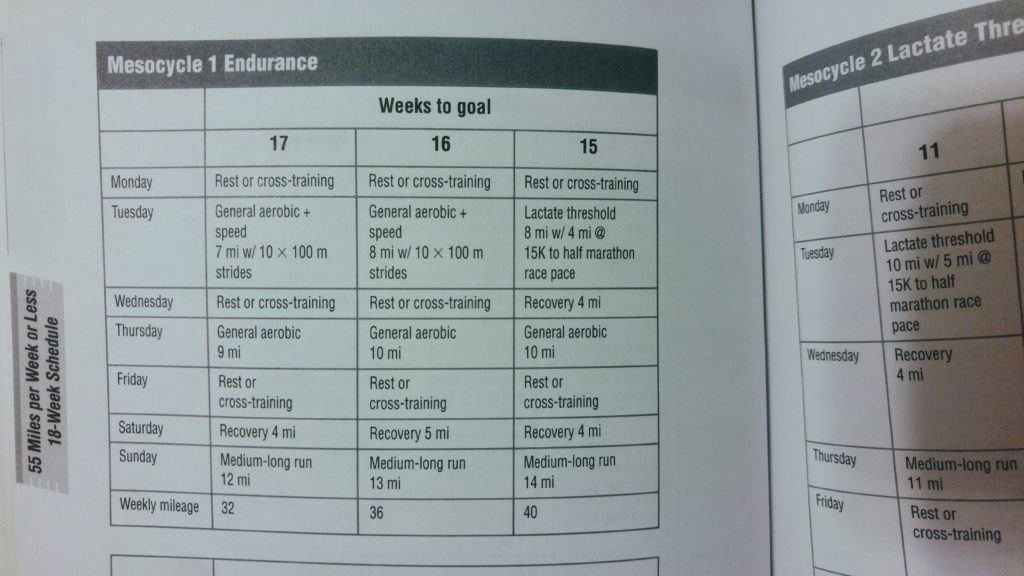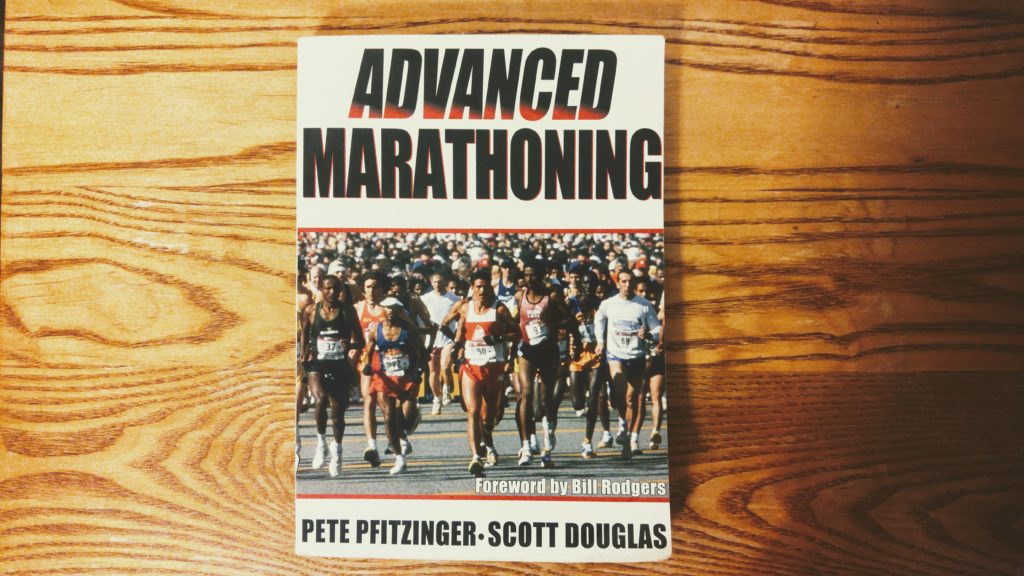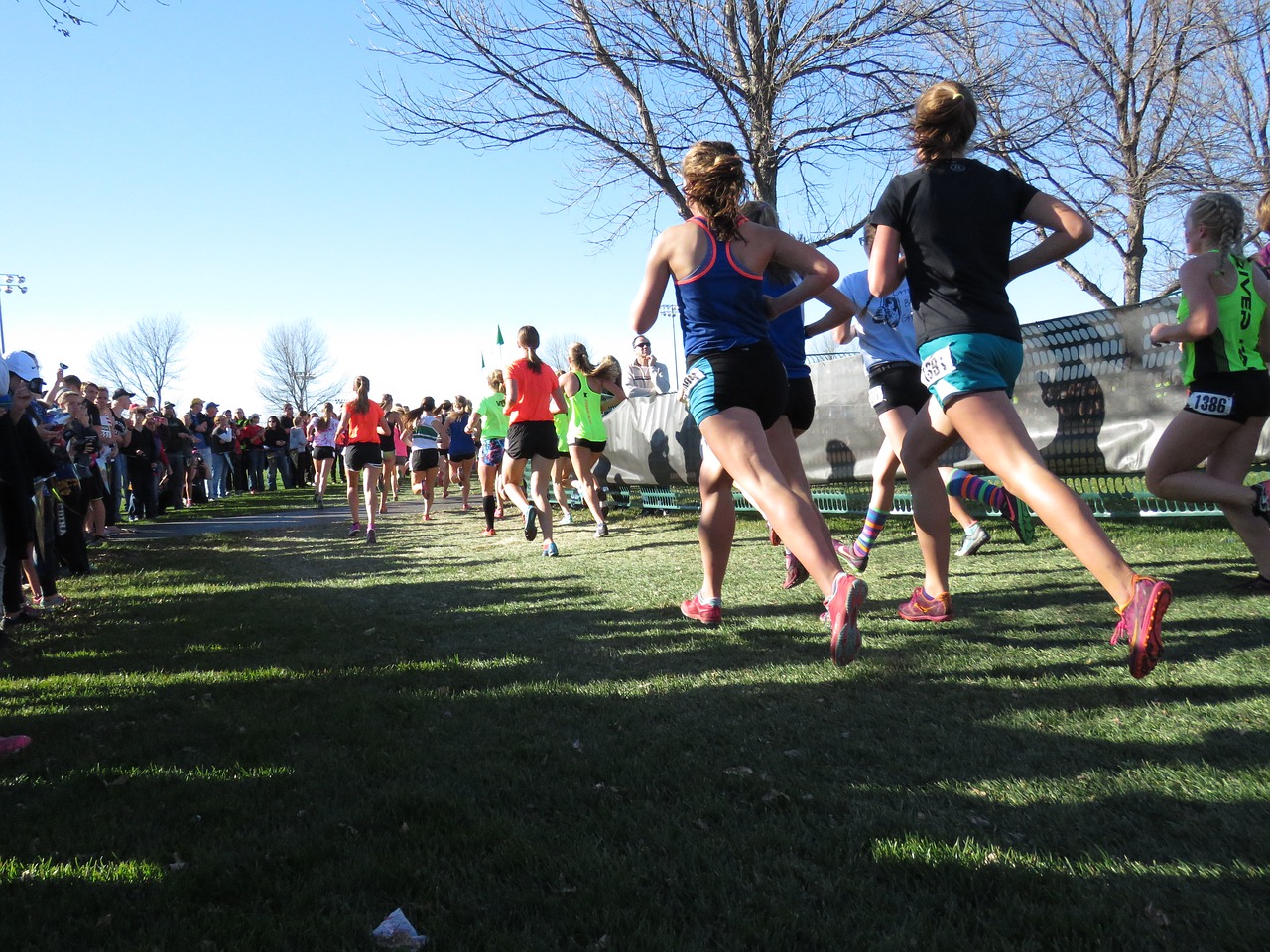Would you like to “do more than simply finish a marathon”? Then check out Advanced Marathoning by Pete Pfitzinger and Scott Douglas.
Advanced Marathoning discusses the physiological requirements for marathon success, what training to prioritize, and has about a hundred pages worth of week-by-week training plans. Read on for my Advanced Marathoning Book Review.
Disclosure: I was not asked to review this book. I was not given this book for purposes for promotion or review. All opinions are entirely my own. The Amazon links below are Amazon Affiliate links. If you click through and buy something, I will earn a small commission at no cost to you. I read and reviewed the first edition of Advanced Marathoning published by Human Kinetics. A second edition is now available.
Book Review: Advanced Marathoning
T hings I liked about Advanced Marathoning
hings I liked about Advanced Marathoning
- Explanation of training elements and how they help you in the marathon
- Instruction on balancing training and recovery
- Marathon training schedules starting at 30-35 MPW (miles per week)
- Marathon training schedules with two marathons 4-12 weeks apart
Things I didn’t like about Advanced Marathoning
- Some dated information on nutrition, hydration, and body physiology. (Reviews have reported the 2nd edition dated as well)
- They limit the charts for lactate threshold and VO2 Max to fast speeds, despite the book’s marketing toward anyone who wants to improve their marathon
- There are marathon training plans starting at 60-65 MPW. If you’re running that much, I recommend a running coach to give you custom guidance and schedule
Summary of Advanced Marathoning
The longest and most valuable chapter describes the qualities of a successful marathoner, including a high lactate threshold, maximal oxygen uptake, and good running economy. They then explain how to develop these qualities through tempo runs, long runs, and VO2max workouts. These aren’t just general descriptions of these workouts, but how to best tweak them for the specificity of marathon training.
At the end of the chapter, they describe how to periodize your training with these elements to design an appropriate marathon training plan.
Besides this chapter on training elements, the chapter on balancing training and recovery is also phenomenal. Great explanations on recovery, supercompensation, overtraining, when to break the hard/easy rule, and tapering provide insight into these running science concepts for all distances.
The remaining chapters on nutrition, hydration, tracking your progress, and race day strategy didn’t excite me. They’re a little dated, too general, or just not mind-blowing. I did like the chapter on supplemental training which talks on flexibility, strength training, and cross training. The second half of the book has week-by-week training plans for the marathon, starting at 30-35 MPW or higher.
Who I’d recommend it for:
I’d recommend this book as general reading for regular marathoners, those with strong running bases, and those interested in piecing together their weeks and months for successful race performances. If you’re a fast runner or a high mileage runner, you could benefit from the training plans in the back of the book, but anyone can learn and apply the literature.








кайтсерфинг египет
кайт школа хургада
красное море температура воды
legalna praca online Polska Стань вебкам моделью в польской студии, работающей в Варшаве! Открыты вакансии для девушек в Польше, особенно для тех, кто говорит по-русски. Ищешь способ заработать онлайн в Польше? Предлагаем подработку для девушек в Варшаве с возможностью работы в интернете, даже с проживанием. Рассматриваешь удаленную работу в Польше? Узнай, как стать вебкам моделью и сколько можно заработать. Работа для украинок в Варшаве и высокооплачиваемые возможности для девушек в Польше ждут тебя. Мы предлагаем легальную вебкам работу в Польше, онлайн работа без необходимости знания польского языка. Приглашаем девушек без опыта в Варшаве в нашу вебкам студию с обучением. Возможность заработка в интернете без вложений. Работа моделью онлайн в Польше — это шанс для тебя! Ищешь “praca dla dziewczyn online”, “praca webcam Polska”, “praca modelka online” или “zarabianie przez internet dla kobiet”? Наше “agencja webcam Warszawa” и “webcam studio Polska” предлагают “praca dla mlodych kobiet Warszawa” и “legalna praca online Polska”. Смотри “oferty pracy dla Ukrainek w Polsce” и “praca z domu dla dziewczyn”.
почему акула напала в египте
Владимир Чернышев
купить металлопрокат цена Купить металлопрокат: подведем итоги Рынок металлопроката в Москве предлагает широкие возможности для выбора. Важно тщательно изучить предложения, сравнить цены и условия, и выбрать надежного поставщика, который сможет обеспечить качественную продукцию и своевременную доставку.
car hauling service Choosing the Right Car Shipping Company Selecting the best car transport service requires careful consideration. Begin by researching and comparing auto shipping quotes from multiple companies. Pay close attention to the details of each quote, including the types of transport offered (open or enclosed), insurance coverage, and estimated delivery times. Look for companies with a proven track record of reliability and positive customer reviews.
Купить надежный дом под ключ Дома из клееного бруса под ключ: Клееный брус – это современный, экологичный и долговечный материал, который идеально подходит для строительства загородных домов. Он обладает высокой прочностью, устойчив к деформациям и гниению, а также обеспечивает отличную теплоизоляцию. Наши дома из клееного бруса отличаются стильным дизайном, комфортной планировкой и высоким качеством исполнения. Мы предлагаем индивидуальное проектирование, учитывающее все ваши пожелания и потребности.
варфейс ак Купить аккаунт Warface: Быстрый старт к новым победам Приобретение аккаунта Warface – это возможность мгновенно получить доступ к высокоуровневому персонажу с прокачанным оружием и снаряжением. Это особенно актуально для тех, кто не хочет тратить время на утомительный процесс прокачки с нуля. На рынке представлены разнообразные предложения, от аккаунтов с 26 рангом до полностью укомплектованных персонажей с редким оружием.
кайтсёрфинг инструктор Температура воды в Хургаде: Круглый год комфортно Декабрь: В декабре температура воды в Хургаде обычно составляет около 23-25°C, что вполне комфортно для купания и занятий водными видами спорта. Март: В марте вода начинает прогреваться, и температура достигает 22-24°C. Апрель: Апрель – прекрасное время для посещения Хургады, так как температура воды поднимается до 24-26°C. Ноябрь: В ноябре температура воды держится на уровне 25-27°C, что делает этот месяц одним из лучших для отдыха на море. Февраль: Февраль – самый прохладный месяц, но даже в это время температура воды редко опускается ниже 22°C.
дизайнер инфографики для маркетплейсов
лунное путешествие
Бездепозитный бонус
Бездепозитные бонусы
Бездепозитный бонус в казино
Бездепозитные бонусы
Бездепозитные бонусы
Бездепозитные бонусы
Бездепозитный бонус
Бездепозитные бонусы
Бездепозитные бонусы в казино
Бездепозитный бонус
Бездепозитный бонус
Бездепозитный бонус в казино
Бездепозитные бонусы в казино
Бездепозитные бонусы
Бездепозитный бонус в казино
Бездепозитные бонусы
Бездепозитный бонус в казино
Бездепозитные бонусы в казино
Бездепозитные бонусы
Бездепозитный бонус в казино
Бездепозитный бонус в казино
Бездепозитные бонусы в казино
гибкая керамика для внутренней Гибкая керамика для фасадов дома внутренней отделки Москва phomi купить цена фоми монтаж за 1 м2 отзывы divu
Бездепозитный бонус в казино
vavada online casino официальный сайт Вавада Казино Официальный Сайт Рабочее Зеркало на Сегодня: Не упустите возможность играть в Вавада Казино, используя рабочее зеркало официального сайта, доступное на сегодня.
Бездепозитный бонус в казино
вавада 100 бесплатных вращений Vavada Casino Приложение: Установите приложение Vavada Casino на свое устройство и наслаждайтесь быстрой и удобной игрой в любое время.
Бездепозитные бонусы в казино
Sykaaa casino скачать бесплатно на телефон Сукааа казино официальный сайт вход бесплатный играть – это возможность попробовать свои силы в демо-режиме без внесения депозита.
Бездепозитные бонусы
vavada casino скачать бесплатно на телефон Vavada Casino Отзывы: Узнайте, что говорят другие игроки о Vavada Casino, и сформируйте свое мнение об этом популярном онлайн-казино.
Бездепозитные бонусы в казино
украли криптовалюту с кошелька что делать
вавада казино официальный рабочее зеркало на сегодняшний день Vavada Casino Скачать: Скачайте приложение Vavada Casino на свое устройство и наслаждайтесь любимыми играми в любое время и в любом месте.
Бездепозитный бонус в казино Бездепозитные бонусы: Путь к азартным приключениям без риска В мире онлайн-казино, где азарт и возможность выигрыша переплетаются в захватывающем танце, бездепозитные бонусы занимают особое место. Эти щедрые предложения служат своеобразным ключом, открывающим двери в мир азартных развлечений без необходимости вкладывать собственные средства.
Бездепозитный бонус
Бездепозитный бонус в казино Бездепозитные бонусы: Путь к азартным приключениям без риска В мире онлайн-казино, где азарт и возможность выигрыша переплетаются в захватывающем танце, бездепозитные бонусы занимают особое место. Эти щедрые предложения служат своеобразным ключом, открывающим двери в мир азартных развлечений без необходимости вкладывать собственные средства.
вавада казино официальный сайт рабочее Вавада Казино Официальный Рабочее Зеркало на Сегодняшний День: Всегда имейте доступ к Вавада Казино через рабочее зеркало, актуальное на сегодняшний день, и не упустите возможность испытать удачу.
Бездепозитные бонусы в казино Бездепозитный бонус в казино: Как его получить? Получить бездепозитный бонус в казино, как правило, довольно просто. Обычно требуется пройти процедуру регистрации на сайте казино и подтвердить свою учетную запись. В некоторых случаях может потребоваться ввести специальный промокод. После выполнения всех условий бонус будет автоматически зачислен на ваш счет. Бездепозитные бонусы – это отличная возможность начать свой путь в мире онлайн-казино с минимальным риском и максимальным удовольствием. Однако, прежде чем принимать бонус, всегда внимательно ознакомьтесь с условиями его использования, чтобы избежать недоразумений в будущем.
Бездепозитные бонусы Бездепозитный бонус: Испытайте удачу без потерь Бездепозитный бонус позволяет игрокам протестировать различные игры, оценить функциональность казино и испытать свою удачу, не рискуя собственными деньгами. Это отличная возможность познакомиться с миром онлайн-казино и понять, насколько он соответствует вашим предпочтениям.
Бездепозитные бонусы
Бездепозитные бонусы Бездепозитный бонус в казино: Как его получить? Получить бездепозитный бонус в казино, как правило, довольно просто. Обычно требуется пройти процедуру регистрации на сайте казино и подтвердить свою учетную запись. В некоторых случаях может потребоваться ввести специальный промокод. После выполнения всех условий бонус будет автоматически зачислен на ваш счет. Бездепозитные бонусы – это отличная возможность начать свой путь в мире онлайн-казино с минимальным риском и максимальным удовольствием. Однако, прежде чем принимать бонус, всегда внимательно ознакомьтесь с условиями его использования, чтобы избежать недоразумений в будущем.
vavada online casino официальный сайт Вавада Казино Официальный Сайт Рабочее: Всегда имейте доступ к Вавада Казино через рабочее зеркало официального сайта, чтобы не пропустить ни одной возможности для игры и выигрыша.
Бездепозитный бонус Бездепозитные бонусы: Путь к азартным приключениям без риска В мире онлайн-казино, где азарт и возможность выигрыша переплетаются в захватывающем танце, бездепозитные бонусы занимают особое место. Эти щедрые предложения служат своеобразным ключом, открывающим двери в мир азартных развлечений без необходимости вкладывать собственные средства.
Бездепозитный бонус Бездепозитные бонусы в казино: Что это такое? Бездепозитный бонус в казино – это денежная сумма или бесплатные вращения, которые казино предоставляет новым игрокам в качестве приветственного подарка. Главное преимущество этого бонуса заключается в том, что для его получения не требуется внесение депозита. Игрок может просто зарегистрироваться на сайте казино и получить бонус на свой счет.
Бездепозитный бонус
хургада кайтсерфинг Кайт Кайт – это не просто спортивный снаряд, это крыло, дающее свободу парить над волнами или снежными просторами. История кайта уходит корнями в древность, но современный кайт, как инструмент для экстремального спорта, появился относительно недавно и быстро завоевал популярность. От простых воздушных змеев до сложных парафойлов и надувных кайтов, конструкция и материалы постоянно совершенствуются, чтобы обеспечить максимальную производительность и безопасность.
Бездепозитные бонусы
1000 рублей за регистрацию
кайт станция египет Обучение кайтсёрфингу Обучение кайтсёрфингу – это следующий шаг после освоения базовых навыков управления кайтом. На этом этапе учатся вставать на доску, контролировать скорость и направление движения, а также выполнять простые трюки. Важно выбирать опытного инструктора и комфортные условия для обучения.
Игорь Стоунберг ясновидящий Советую всем, кому нужна помощь, обращаться к Игорю.
биткоин анализ 2025 Биткоин анализ на 2025 год предсказывает значительный рост цены, обусловленный растущим принятием и ограниченным предложением.
кайтсёрфинг Кайт школа Кайт школа – это место, где мечты о покорении волн с помощью кайта становятся реальностью. Квалифицированные инструкторы, современное оборудование и безопасные условия позволяют быстро и эффективно освоить навыки кайтинга и кайтсерфинга.
Бездепозитные бонусы в казино
кайт лагерь Обучение кайтингу Обучение кайтингу – это важный этап для каждого начинающего кайтсерфера. Профессиональные инструкторы помогут освоить базовые навыки управления кайтом, научат правилам безопасности и расскажут о метеорологических особенностях. Постепенное освоение техники позволит избежать травм и получить максимальное удовольствие от катания.
1000 рублей за регистрацию вывод сразу
кайтсёрфинг Кайтсёрфинг Кайтсёрфинг – это сплав ветра, воды и мастерства. Этот вид спорта позволяет скользить по водной глади, используя силу ветра, пойманную кайтом. Это динамичный и захватывающий способ провести время на открытом воздухе, требующий определенной физической подготовки и навыков управления кайтом и доской.
кайт станция египет Кайт египет: Открой для себя лучшие кайт-споты Египта
Бездепозитные бонусы
1000 рублей за регистрацию в казино без депозита
сертификат кайтсерфинг iko Кайт: Не просто спорт, а образ жизни. Почувствуй единение с природой, силу ветра и волн. Кайт – это адреналин, свобода и новые впечатления.
можно ли встретить акулу осенью в египте Кайт школы Санкт Петербург: Где научиться кайтсерфингу в Санкт-Петербурге?
кайт центр Кайт лагерь: Активный отдых и обучение кайтингу в компании единомышленников.
Бездепозитный бонус в казино
кайтсерфинг в египте места Кайт центр: Все для кайтсерфинга: оборудование, обучение, ремонт.
1000 рублей за регистрацию в казино без депозита вывод сразу
гидрофойл с кайтом обучение : Международная карточка iko: Подтверждение твоих навыков!
сертификат кайтсерфинг Кайт школа СПб: Начни свой путь в кайтсерфинге в Санкт-Петербурге.
почему в хургаде холодное море detivetra: Ваш надежный партнер в мире кайтсерфинга. Обучение, оборудование, путешествия – все, что нужно для незабываемых впечатлений.
Бездепозитный бонус в казино
фонтан казино бездепозитный бонус 1000 рублей за регистрацию без депозита с выводом денег
кайт серфинг в египте Кайт школа: Найдите свою идеальную школу и начните свое кайт-приключение!
кайтинг в хургаде в июле Кайт споты Египта: Обзор лучших мест для кайтсерфинга в Египте.
хургада кайтсерфинг : Где в египте кайтсерфинг: Лучшие места для катания!
Бездепозитные бонусы в казино
1000 рублей за регистрацию вывод сразу без вложений в казино адмирал
кайт споты египта Кайт сафари хургада: Незабываемое путешествие по лучшим кайт-спотам Хургады. Открой для себя новые места и ощути настоящий кайтсерфинг драйв.
туризм 2025 Кайт серфинг в Египте – это отличный способ активно провести время и получить заряд положительных эмоций.
кайт школа в хургаде египет Кайт дети ветра: Открой мир кайтсерфинга с профессионалами. Почувствуй свободу, адреналин и единение с природой. Мы поможем тебе освоить этот захватывающий вид спорта безопасно и эффективно.
кайтсерфинг в египте Кайт сафари хургада: Незабываемое путешествие по лучшим кайт-спотам Хургады. Открой для себя новые места и ощути настоящий кайтсерфинг драйв.
1000 рублей за регистрацию вывод сразу без вложений
кайт лагерь Кайтсерфинг хургада: Лучшие кайт-споты Хургады ждут вас!
kite in hurghada for germany Обучение кайтсёрфингу: Уникальная методика обучения, позволяющая быстро и безопасно освоить азы кайтсерфинга.
Бездепозитные бонусы в казино
1000 рублей за регистрацию вывод сразу без вложений
кайт школа в хургаде : Кайт сафари хургада: Незабываемое путешествие по самым живописным кайт спотам!
как часто к берегам хургады подплывают акулы Обучение кайтсёрфингу: Научитесь читать ветер, управлять кайтом, скользить по волнам и выполнять захватывающие трюки с нашей командой опытных инструкторов. Мы гарантируем безопасное и эффективное обучение, которое позволит вам быстро прогрессировать и получать максимум удовольствия от кайтсерфинга.
Бездепозитный бонус
кайт сафари : Кайт школа: Забудьте про серые будни! Кайт школа – это место, где вы найдете новых друзей, получите заряд бодрости и откроете для себя новый мир!
1000 рублей за регистрацию вывод сразу без вложений в казино адмирал
международная карточка iko : Кайтсерфинг хургада: Гарантированный ветер и теплая вода круглый год!
gumaushi kaiting : Кайт: Почувствуй свободу полета над водой!
Бездепозитные бонусы
нет акул кап ру : Кайт кемп: Интенсивное обучение для быстрого прогресса!
1000 рублей за регистрацию в казино без депозита
остров тавила хургада акулы : Почему в хургаде холодное море: Наслаждайся комфортным катанием!
почему в хургаде холодное море : Кайт школа в хургаде: Твой проводник в мир кайтсерфинга!
Бездепозитные бонусы
1000 рублей без депозита
Погружение в египте Реестр нападения акул на человека – это база данных, содержащая информацию о зарегистрированных случаях нападения акул на людей. Дайвинг в Москве
Баротравма Дайвер открытой воды – это сертифицированный дайвер, имеющий право погружаться на глубину до 18 метров в сопровождении партнера. Владение плавучестью
open water diver Реакция акул на человеческую кровь – это миф, не имеющий научного подтверждения. Реестр нападения акул на человека
повешенные шторы Шторы – это душа интерьера, молчаливый рассказчик о вкусах и предпочтениях хозяев. Они способны преобразить комнату до неузнаваемости, добавить уюта или, наоборот, внести нотку строгости и элегантности. Рулонные шторы
шторы на пластиковые окна Ткань для штор – это важный элемент, который определяет внешний вид и функциональность штор. Рулонные шторы купить
признаками фишингового сайта являются Фишинговый сайт это, простыми словами, обманчивый сайт, созданный для воровства ваших паролей и других личных данных. Делаем фишинговый сайт
варфейс акк Аккаунт Warface – это ваш ключ к захватывающим сражениям, кооперативным миссиям и командной работе. Купить оружие Варфейс
Натяжные потолки Мирный Натяжные потолки в Домодедово – это быстрый и простой способ обновить интерьер без лишних хлопот. Натяжные потолки Красково
аренда машины краснодар Аренда авто без залога: Простое решение для тех, кто ценит мобильность без лишних хлопот. Забудьте о сложных процедурах и крупных депозитах, наслаждайтесь поездкой без лишних финансовых обременений.
Бездепозитный бонус в казино Бездепозитные бонусы
вавада казино официальный рабочее зеркало на сегодняшний день Вавада Казино Официальный Сайт Вход
фонтан казино бездепозитный бонус 1000 рублей за регистрацию без депозита с выводом денег Многие казино, стремясь привлечь новых клиентов, предлагают 1000 рублей за регистрацию с моментальным выводом, не требующим никаких вложений. Это привлекательная возможность для тех, кто хочет испытать свою удачу без риска для собственного бюджета. 1000 рублей за регистрацию в казино без депозита вывод сразу
https://b2shop.gl/bs2_best_at.html
https://bs2best.cat
shipping china to uae Shipping China to UAE: Navigating the Intricacies of Incoterms
пионы москва Доставка пионов в Москве: Изысканное прикосновение к совершенству. Ощутите нежность шелковистых лепестков, представьте тонкий аромат, наполняющий пространство, и осознайте, что роскошь может быть доступной. Мы предлагаем не просто доставку цветов, а создание момента, который запомнится надолго. Наша коллекция включает в себя редкие сорта пионов, отобранные с особой тщательностью, чтобы удовлетворить даже самый изысканный вкус. От классических розовых букетов до смелых композиций с экзотическими оттенками – у нас вы найдете идеальный подарок для любого случая. Мы ценим ваше время, поэтому гарантируем быструю и надежную доставку по Москве.
скачать игры с облака mail Скачать игры с Яндекс Диска: Удобство и надежность в одном месте. Яндекс Диск – это не только удобное облачное хранилище, но и отличный способ скачивать игры. Получите доступ к огромной коллекции игр, загруженных на Яндекс Диск, и наслаждайтесь быстрой и безопасной загрузкой. Просто скачайте нужный файл и начинайте играть. Этот метод гарантирует надежность и безопасность, так как все файлы проходят проверку на вирусы.
https://1-bs2best.art/index.html
https://bs2tcite4.io
устранение утечки фреона алматы Ремонт посудомоечных машин Hotpoint Ariston Алматы: Ремонт Hotpoint Ariston.
кайт В Хургаде всегда ветер почему: Благоприятные условия В Хургаде почти всегда ветер благодаря географическому положению и климатическим условиям.
1000 рублей за регистрацию вывод сразу без вложений в казино с выводом без депозита 1000 рублей без депозита
https://bs2bcst.at
киа карнивал Купить БМВ: Удовольствие от вождения BMW – это бренд, известный своими спортивными автомобилями, предлагающими превосходную управляемость и динамику.
wine lover gift Oiseaux et Vin (French for “Birds & Wine”) is Alesya G’s elegant bird collection for wine lovers. Explore bird-themed drinkware and accessories – from chic stemless wine glasses and insulated tumblers to fun phone cases featuring wine-sipping birds. These unique gifts marry French style with humor, perfect for wine enthusiasts and bird lovers alike. Sip and celebrate – shop wine-bird mugs, shirts, and decor now!
Бездепозитные бонусы Казино, предлагающие бездепозитные бонусы, словно заботливые хозяева, приглашают гостей в свой дом и предлагают им угощение на пробу. Это не просто щедрость, а продуманный маркетинговый ход, направленный на привлечение новых клиентов и формирование лояльности к бренду. Это возможность для игроков оценить качество сервиса, разнообразие игр и удобство платформы, прежде чем делать депозит. Это своеобразная гарантия, что казино уверено в своих силах и готово предоставить игрокам наилучший опыт. Бездепозитный бонус
methylone Ephedrine is often used to produce phenylacetone, a key intermediate in stimulant synthesis. From phenylacetone, substances like methylone, mephedrone (4-MMC), and 3-CMC can be made using methylamine. Phenylnitropropene, derived from nitroethane, is another precursor. A-PVP and 4-methylpropiophenone are also widely used in synthetic drug production. BMK glycidate is commonly used to synthesize controlled substances.
Укладка асфальта
methylamine Ephedrine is often used to produce phenylacetone, a key intermediate in stimulant synthesis. From phenylacetone, substances like methylone, mephedrone (4-MMC), and 3-CMC can be made using methylamine. Phenylnitropropene, derived from nitroethane, is another precursor. A-PVP and 4-methylpropiophenone are also widely used in synthetic drug production. BMK glycidate is commonly used to synthesize controlled substances.
https://2-bs2best.lat/bs2_best_at.html
https://b2tsite4.io/index.html
https://a-bsme.at/bs2web_at.html
Бездепозитные бонусы Бездепозитные бонусы
https://b2tor2.cc/darknetmarket.html
https://bs2bsme.at
vavada casino скачать Вавада Казино Официальный Сайт Вход
проститутки макеевка Проститутки Горловка – такая же ситуация, как и в предыдущих случаях.
husegprogram
https://1-bs2best.lat/https_bs2best_at.html
https://1-bs2best.art/bs2_best_at.html
новые бездепозитные бонусы в казино 2020 вк Бездепозитные бонусы
психиатрическая клиника Психиатрическая клиника. Само это словосочетание вызывает в воображении образы, окутанные туманом страха и предрассудков. Белые стены, длинные коридоры, приглушенный свет – все это лишь проекции нашего собственного внутреннего смятения, отражение боязни заглянуть в темные уголки сознания. Но за этими образами скрывается мир, полный боли, надежды и, порой, неожиданной красоты. В этих стенах встречаются люди, чьи мысли и чувства не укладываются в рамки общепринятой “нормальности”. Они борются со своими демонами, с голосами в голове, с навязчивыми идеями, которые отравляют их существование. Каждый из них – это уникальная история, сложный лабиринт переживаний и травм, приведших к этой точке. Здесь работают люди, посвятившие себя помощи тем, кто оказался на краю. Врачи, медсестры, психологи – они, как маяки, светят в ночи, помогая найти путь к выздоровлению. Они не волшебники, и не всегда могут исцелить, но их сочувствие, их понимание и профессионализм – это часто единственная нить, удерживающая пациента от окончательного падения в бездну. Жизнь в психиатрической клинике – это не заточение, а скорее передышка. Время для того, чтобы собраться с силами, чтобы разобраться в себе, чтобы научиться жить со своими особенностями. Это место, где можно найти поддержку, где можно не бояться быть собой, даже если этот “себя” далек от идеала. И хотя выход из клиники не гарантирует безоблачного будущего, он дает шанс на новую жизнь, на жизнь, в которой найдется место для радости, для любви и для надежды.
https://1-bs2best.art/blaksprut_ssylka.html
https://b2tsite4.io/bs2best.html
казино в котором реально можно выиграть деньги и вывести Бездепозитный бонус – это шанс сорвать куш, не вкладывая ни копейки. Он позволяет испытать азарт, риск и радость победы, не испытывая страха потери собственных средств. Это особенно ценно для начинающих игроков, которые еще не готовы рисковать большими суммами. Бездепозитный бонус в казино
штора без Ткань для штор — ключевой фактор, влияющий на внешний вид и эксплуатационные характеристики. Натуральные ткани придают интерьеру тепло и уют, а синтетика облегчает уход и повышает износостойкость.
Оптом подшипник цена Завод изготовитель подшипников BBCR оснащен современным оборудованием и использует передовые технологии для производства подшипников высокого качества. Мы гарантируем надежность и долговечность нашей продукции.
экскурсии в питере Соборы Санкт-Петербурга – величественные памятники архитектуры и духовности. Телеграм расскажет об истории и особенностях каждого собора.
Фрибеты за регистрацию Футбол ставки – самый популярный вид спортивных ставок. Миллионы фанатов делают прогнозы на исходы матчей, тоталы и другие события.
монтаж гибкой керамики Divu гибкая керамика применяется в частных домах, офисных зданиях и общественных сооружениях.
услуга pr Разработка позиционирования – это определение уникального места бренда на рынке и в сознании потребителей.
libreoffice персонализированное образование Персонализированное образование — это подход, который ставит в центр ученика, его интересы, цели и индивидуальные особенности. Технологии играют ключевую роль в реализации этой модели. Компания «Astana IT Garant» помогает учебным заведениям Казахстана делать шаги к настоящему персонализированному образованию. Мы предлагаем инструменты, которые делают персонализацию возможной. Это платформы для создания индивидуальных учебных планов, где ученик вместе с тьютором может выбирать курсы и проекты в соответствии со своими интересами. Это системы адаптивного обучения, которые подстраивают сложность заданий под уровень ученика. Это конструкторы курсов и цифровые портфолио, где ученики могут собирать свои достижения. Мы помогаем создавать гибкие учебные пространства с зонами для индивидуальной и групповой работы, которые ученики могут использовать для реализации своих проектов. «Astana IT Garant» понимает, что персонализация — это не только технологии, но и изменение педагогической культуры. Поэтому мы проводим для учителей тренинги по тьюторству, проектной деятельности и другим методикам, которые лежат в основе персонализированного подхода. Мы поможем вам создать среду, где каждый ученик сможет построить свой уникальный образовательный маршрут.
Бездепозитные фрибеты Ставки онлайн – это удобство и доступность. Делайте ставки в любое время и в любом месте, используя свой компьютер или мобильное устройство.
Нейроша советует Интересное про нейросети привлекает внимание к новым открытиям и возможностям.
сборка компьютеров на заказ Сборка компьютеров для игр – специализируемся на создании мощных и надежных игровых машин.
металлообработка Металлообработка – это обширная сфера деятельности, охватывающая широкий спектр процессов, направленных на изменение формы, размеров и свойств металлов и сплавов. От простых ручных операций до высокотехнологичных автоматизированных производств, металлообработка играет ключевую роль во многих отраслях промышленности, обеспечивая создание деталей, инструментов и конструкций, необходимых для функционирования современного мира.
Денежная магия Как пережить расставание – расставание – болезненный процесс, требующий времени и поддержки близких людей.
https://mebelsoskidkoy.ru/ Мебельные тренды 2025: взгляд в будущее комфорта и стиля 2025 год обещает стать поворотным в мире мебельного дизайна. Технологии, экологичность и индивидуализация – вот три кита, на которых будет держаться современный интерьер. Экологичность как must-have: Устойчивое развитие больше не просто тренд, а необходимость. В 2025 году мы увидим повсеместное использование переработанных материалов, таких как переработанный пластик, бамбук и переработанное дерево. Производители будут стремиться к замкнутому циклу производства, минимизируя отходы и используя возобновляемые источники энергии. Потребители, в свою очередь, будут отдавать предпочтение мебели, имеющей экологические сертификаты и подтвержденное происхождение. Технологии на службе комфорта: Умная мебель станет неотъемлемой частью дома. Встроенные зарядные устройства, регулируемая подсветка, встроенные колонки и даже системы автоматической регулировки температуры – все это станет обыденностью. Особое внимание будет уделяться эргономике и адаптивности мебели под индивидуальные потребности пользователя. Индивидуализация как искусство: Серийное производство уступает место персонализированному дизайну. Возможность выбора цветов, материалов, размеров и даже функциональности мебели позволит создать уникальный интерьер, отражающий индивидуальность владельца. 3D-печать мебели станет более доступной, открывая безграничные возможности для кастомизации. В 2025 году мебельный дизайн будет ориентирован на создание комфортного, функционального и экологичного пространства, отражающего индивидуальность владельца. Технологии, устойчивость и персонализация – вот три ключа к интерьеру будущего. https://mebelsoskidkoy.ru/
hardware id spoofer HWID Spoofer: Обход блокировок в Real Racing 3
https://stroidom36.ru/catalog/doma-s-terrasoi/ Выбор окон – важный элемент энергоэффективности дома. Пластиковые, деревянные, алюминиевые – окна должны обеспечивать хорошую теплоизоляцию и звукоизоляцию.
работа военным Служба в армии – это школа жизни, которая закаляет характер, учит преодолевать трудности и ценить простые вещи.
formation acting Ateliers de theatre
Знахарка Как пережить расставание с любимым
Лучшие эфирные масла для уверенности в себе Как эфирные масла помогают в проработке страхов: Преодолейте свои страхи и фобии с помощью силы ароматов. Эфирные масла могут помочь вам осознать корень проблемы, высвободить заблокированные эмоции и обрести уверенность в себе.
Грузоперевозки Луганск Грузоперевозки Луганск: Транспортировка негабаритных грузов. Специализированный транспорт, опытные такелажники, оформление необходимых разрешений. Безопасная и надежная доставка.
магазин штор пятигорск (Повтор) Где в Пятигорске Можно Купить Жалюзи Шторы: Поиск Места
завьялов илья поинт пей PointPay: Илья Завьялов о важности комплаенса и соблюдения нормативных требований
колесики для душевой кабины Сифон для душевой кабины с гидрозатвором купить: защита от запахов
мистический онлайн Бесплатный доступ к мистическому контенту открывает двери в мир паранормальных явлений для каждого, кто ищет острых ощущений и готов к встрече с неизведанным.
Dual Access Bazaar Drugs Marketplace: A New Darknet Platform with Dual Access Bazaar Drugs Marketplace is a new darknet marketplace rapidly gaining popularity among users interested in purchasing pharmaceuticals. Trading is conducted via the Tor Network, ensuring a high level of privacy and data protection. However, what sets this platform apart is its dual access: it is available both through an onion domain and a standard clearnet website, making it more convenient and visible compared to competitors. The marketplace offers a wide range of pharmaceuticals, including amphetamines, ketamine, cannabis, as well as prescription drugs such as alprazolam and diazepam. This variety appeals to both beginners and experienced buyers. All transactions on the platform are carried out using cryptocurrency payments, ensuring anonymity and security. In summary, Bazaar represents a modern darknet marketplace that combines convenience, a broad product selection, and a high level of privacy, making it a notable player in the darknet economy.
военная служба по контракту Военная служба по контракту для женщин: возможности и особенности Женщины имеют право поступать на военную службу по контракту на различные должности, за исключением должностей, связанных с повышенной опасностью.
Служба по контракту Служба по контракту: Стабильная работа, социальные гарантии и уверенность в завтрашнем дне